3 Keys to Ecommerce Content Marketing That Drives Conversion
Focusing on content conversion is one of the simplest ways to up your revenue on ecommerce. Here's what a conversion-based ecommerce content strategy looks like.
Your ecommerce revenue is the product of three basic factors—traffic, price, and conversion. If you're serious about increasing your revenue on online marketplaces like Amazon, your strategy needs to revolve around increasing one or more of these factors. Learn more about the ecommerce equation here. Traffic can be expensive to increase, especially if your strategy includes paid advertising. Increasing your price isn’t usually a wise option because of the intense competition on online marketplaces.
Focusing on conversion, on the other hand, is one of the simplest ways to up your revenue on ecommerce without investing in advertising or raising your prices. But what does a conversion-based ecommerce strategy look like in practice? Pattern ecommerce experts answered that question, and many more, in a Jan. 20, 2021, webinar titled, “Marketplace Content Conversion: Dialing in Your 2021 Creative Strategy.”
3 keys to creating marketing content that converts
Content is the key to conversion on Amazon. Everything you curate to educate your customers about your products—listing titles, descriptions, photos, videos, A+ content, and below-the-fold marketing content—influence whether they click “add to cart” or keep shopping. But not all ecommerce content is created equal.
At Pattern, we don’t want our partners to create content that just takes up space, but content that directly translates to increased revenue. To create marketing content that converts, we focus on three key goals: engage, educate, and connect. “We make some really beautiful visuals, but that’s not the goal,” said Pattern VP of Creative Josh Mendenhall in the webinar. “The goal is to do these three things of keeping someone engaged in this product.”
1. Engage
To successfully engage a customer, Mendenhall explained, brands need to focus more on high quality photo and video elements. “Just because you have a product on Amazon and there’s a picture of it doesn’t mean that someone’s going to buy it,” Mendenhall said. “Educating consumers through the visuals of the product is the biggest thing that might be overlooked.”
Your photo stack should feature professional-quality images in a variety of settings. Here are a few best practices for ecommerce marketing content engagement on ecommerce:
- Focus on lifestyle-led images that show consumers how your product can fit into their day-to-day lives.
- Highlight your product’s key features by using photos showing it in use and in its environment.
- Include aspirational photos with situations that customers can see and hope for in their own lives.
Mendenhall highlighted Pattern’s work with Popsockets, a popular phone grip brand, as an example of engaging photography. Pattern’s creative teams didn’t just create an image stack with a product 7 different times in 7 different angles. Instead, we showcased the glow-in-the-dark feature by shooting the product images in a set with black lights, and incorporated different types of photography to keep the consumer interested and engaged.
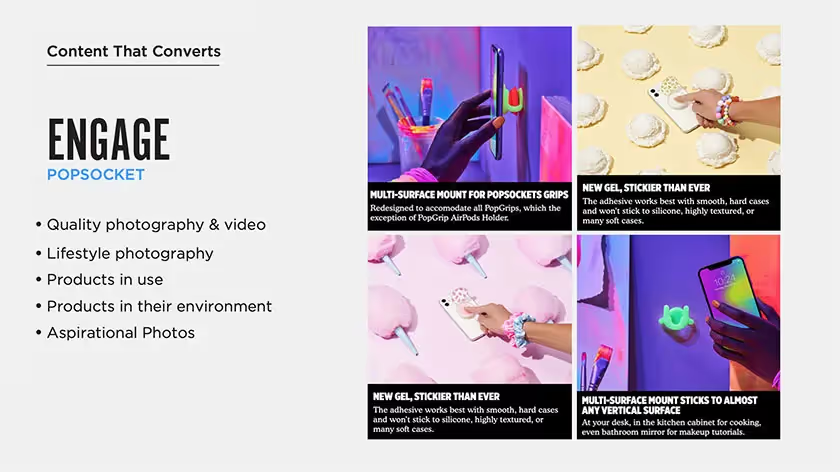
2. Educate
It’s a misconception that product education only happens through the bullet points, Mendenhall emphasized. He called image stacks a “huge opportunity” when it comes to educating consumers and pushing them closer to converting.
The average person will view every image in an image stack but only read 20% of the webpage. Make sure your photos show key features and benefits of your product. You can use iconography or infographic images to educate in a way that still engages. It can also be helpful to layer your images with powerful testimonials that would otherwise be buried by reviews. Consider showing your product’s actual size by comparing it to a common object and show consumers how to use your product.
Consider Pattern’s work with the health brand Thorne, pictured below. Highlighting the supplement’s key features—including that it’s dairy, soy, and gluten free—educates customers about the product through the photo stack instead of through the product description that’s often ignored.
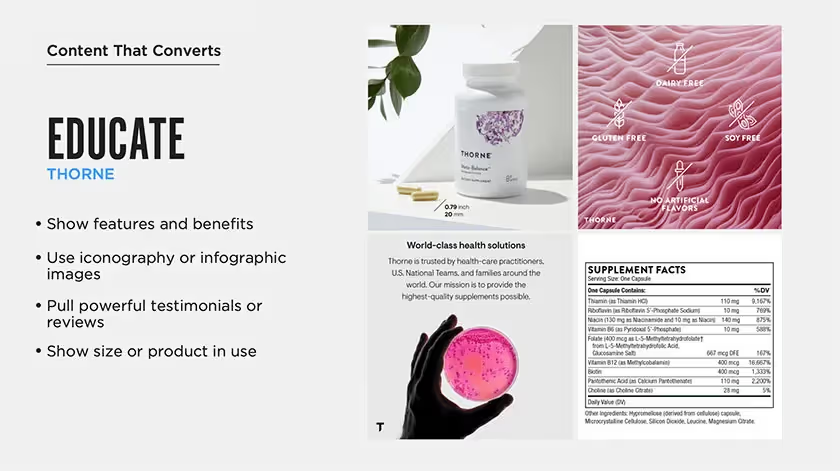
3. Connect
Connection is the third and final key to creating ecommerce content that converts. Consumers want to buy from brands they can feel emotionally connected to and passionate about. Prioritize establishing and maintaining a consistent brand voice, branding, and style. It’s important to only work with partners and agencies that understand your style and are committed to maintaining it. Understand your demographic and highlight them in your visuals. And like we mentioned before, use aspirational photography when it makes sense.
The marketing below is a great example of a brand that uses its image stack to both highlight their demographic and use aspirational photography. Pattern partner Owlet creates a sock that monitors a sleeping baby’s heartbeat and oxygen levels. Since Owlet’s key demographic is mothers, particularly mothers who are seeking for reassurance that their babies are safe at night, the images highlight mothers who look rested, relaxed, and happy.
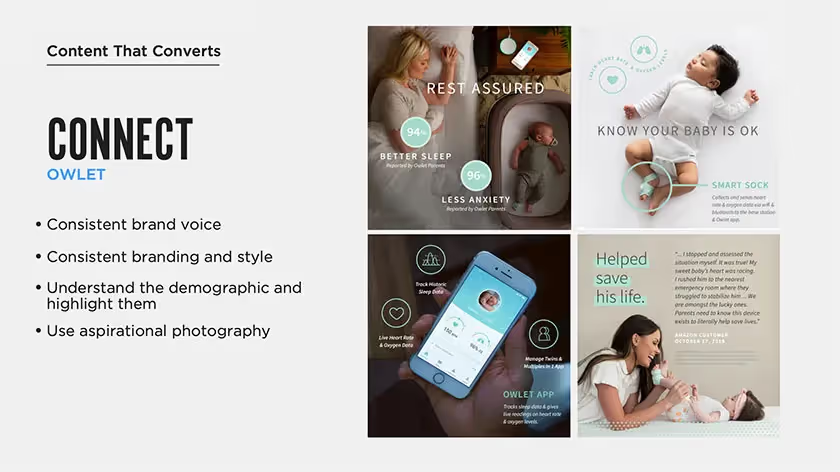
Best practices in ecommerce marketing content creation
While engaging, educating, and connecting form the basis of our content creation strategy, Mendenhall mentioned several additional tips and best practices that brands should keep in mind. Below are just a few:
- Update and refresh your marketing content. While your brand should stay consistent, it’s important to periodically refresh your content. This is especially relevant for brands whose products perform best during certain times of the year. Make sure these updates are always data-based.
- Create personas for your target demographic. Before you can implement any of your creative content, it’s important to understand who your client is and what kind of marketing content they’ll likely connect with.
- Adapt listings for an international audience. When selling internationally, remain true to your brand while also appealing to the target international audience. Make sure all translations are accurate. You may also consider international live streaming or microblogging.
- Consider investing in video content. Using video in your product listings improves conversion by up to 85%, helps SEO, increases email click through rates by 96%, and reduces returns by a quarter.
- Maximize every opportunity to tell your brand’s story. This means using every available image slot, taking advantage of tools like A+ Content, creating an Amazon storefront consistent with your brand, and hosting Amazon Live events.
How working with Pattern can help you increase content conversion on ecommerce
For this webinar, we invited one of our partners, Zebra, to share how working with Pattern helped them improve their brand equity and increase conversion. Before partnering with Pattern, Zebra struggled with more than 100 vendors selling their products on Amazon with inconsistent product listings and poor quality creative content.
Now, Pattern is the sole seller for the brand, which has increased conversion and revenue. Zebra Ecommerce Strategy Advisor Cathy Lowery shared a similar experience with Pattern. Lowery said Zebra started partnering with Pattern 3 years ago to fix what she called a “mess” on ecommerce. Unauthorized sellers had started to cause a disruption in the marketplace because of poor image quality and inaccurate product listings. “When we decided that the right strategy was to engage with one authorized seller, which was Pattern, that took us down the journey and the path of fixing all of those images and listings and so forth,” Lowery said. “And we’ve been extraordinarily happy with the results.”
Are you ready to take control of your brand and start creating ecommerce marketing content that converts? Pattern is here to help. Contact us.

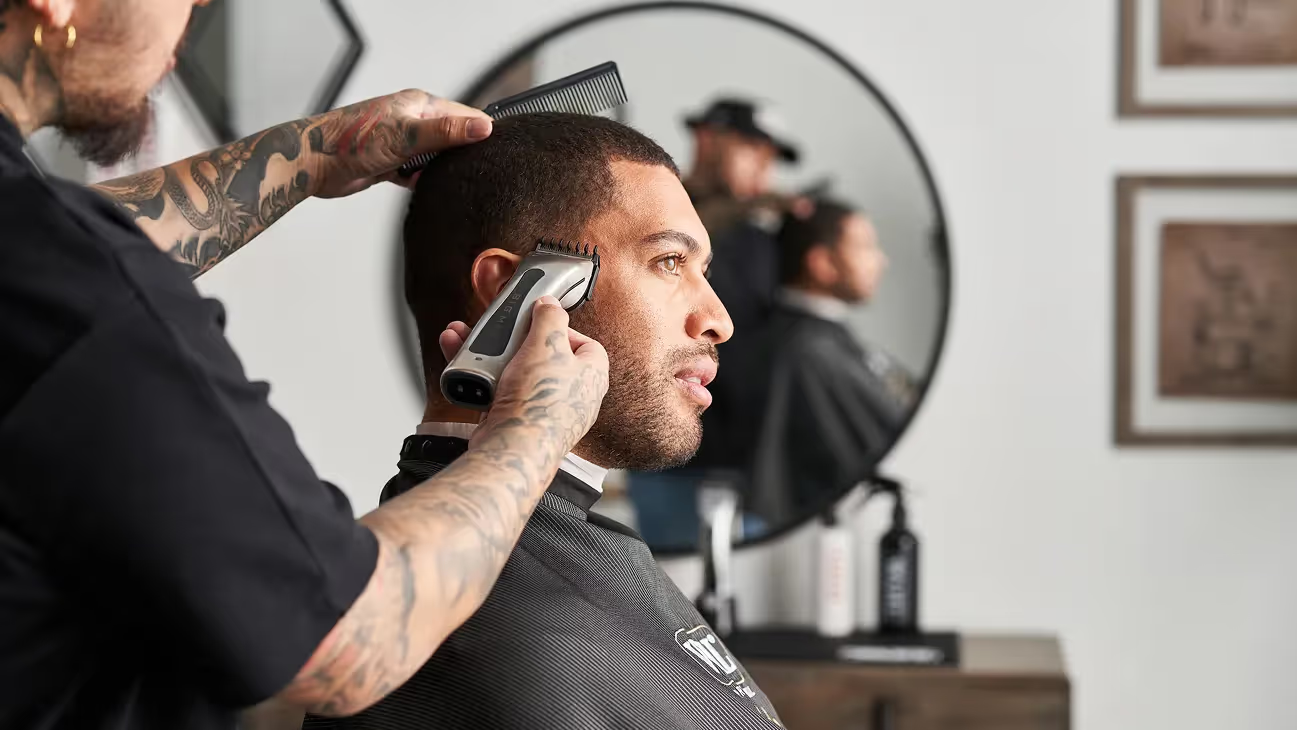
.jpg)
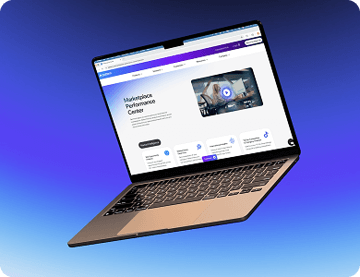

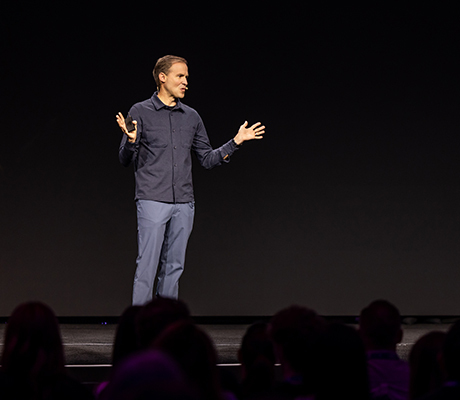


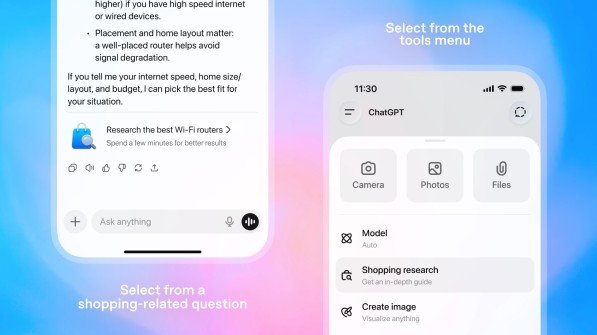
.jpg)
%20(1).jpg)